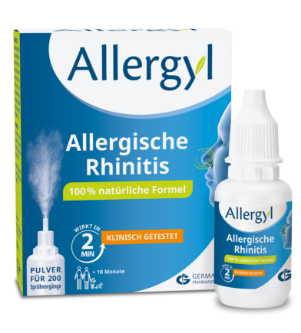Germania Pharmazeutika GmbH
Allergyl Allergic rhinitis nasal spray 200 doses
Allergyl Allergic rhinitis nasal spray 200 doses
5.0 / 5.0
(1) 1 レビュー数の合計
受取状況を読み込めませんでした
How does the Allergyl Protective Spray work?
The most effective therapy is allergen avoidance. In order to prevent pollen from settling in the human respiratory system and triggering annoying allergy symptoms there, Allergyl offers a preventive solution for hay fever and allergic rhinitis. Allergyl is a nasal spray made from vegetable cellulose and peppermint in powder form. The powder converts into a gel in the nose, which forms a protective layer for about six hours, trapping pollen and other allergens before they can trigger an allergic reaction.
All advantages of Allergyl Protective Spray at a glance
What makes Allergyl Protective Spray so special?
Relieves allergic symptoms within a few minutes
Does not run out of the nose and into the throat
Suitable for children from 18 months, also during pregnancy and breastfeeding
100% natural (contains no drugs or preservatives)
Combines well with other anti-allergic drugs
Properties
Allergyl Protective Spray is a preventive treatment for hay fever and allergic rhinitis caused by pollen, animal hair or dust mites.
Allergyl Protective Spray is 100% natural, it contains no medicines or preservatives
Mode of action
Unlike medicines that relieve allergic symptoms, Allergyl Protective Spray has a preventive effect to prevent an allergic reaction even before the symptoms appear.
Allergyl Protective Spray is a nasal spray in powder form. In the nose, the powder converts into a gel that forms a complete protective layer against airborne allergens.
Allergyl works exactly where the allergic reaction begins by protecting the nasal mucosa from airborne allergens. In this way, the release of histamine and other inflammatory mediators from the mast cells (degranulation) can be prevented.
The rapid effect and very good tolerability of Allergyl Protective Spray has been documented in over 35 scientific publications and proven in more than 1,000 patients.
Application
Allergyl protective spray should be used before contact with the allergens so that they do not come into contact with the nasal mucosa and thus cannot trigger an allergic reaction.
The strength of the pollen load, the proximity to a pollen source and the allergy tendency of the patient determine how often Allergyl should be used, usually 2-3 times a day or after each blowing of the nose.
Allergyl has been shown to be effective for up to 6 hours per application.
Dosage: 1-2 sprays in each nostril
Share


